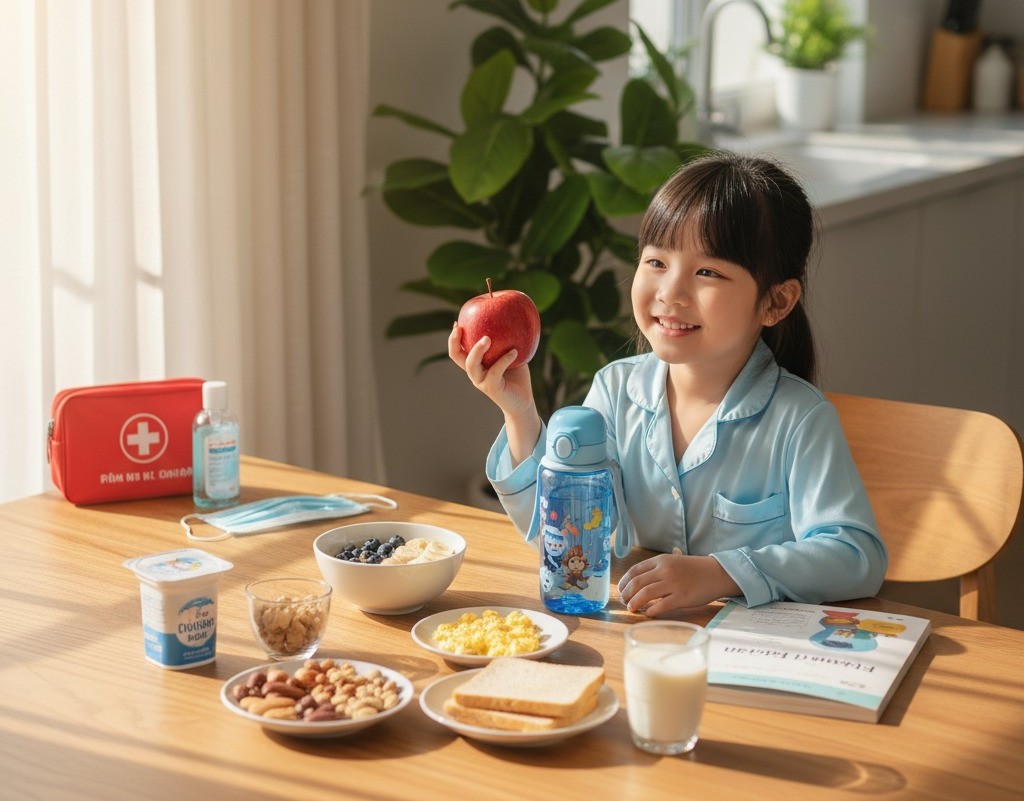A nutritious breakfast is crucial
Doctor Phan Thi Tuong Van, a pediatrician at Tam Anh General Clinic in District 7, explains that breakfast provides glucose, the primary fuel for the brain and muscles, helping children stay alert, focus on their studies, and participate in physical activities. Eating breakfast helps children improve memory and problem-solving skills. It also helps stabilize blood sugar levels, reducing cravings for unhealthy snacks, and thus effectively managing weight. A delicious breakfast contributes to a positive mood, reducing irritability and anxiety.
Parents should provide children with breakfast foods containing complex carbohydrates such as whole-wheat bread, oatmeal, rice, vermicelli, pho, sweet potatoes, and more. Add protein from eggs, milk, lean meat, fish, tofu, cheese, and other sources to support muscle and bone development, as well as brain function. A small amount of butter, vegetable oil, and nuts provide energy and enhance the absorption of fat-soluble vitamins. Fresh fruit and green vegetables supply essential micronutrients for immunity and child development.
Balanced and varied lunch and dinner
Protein, vitamins, and minerals from meals are the foundation for the development of bones, muscles, the nervous system, and other organs. Children who eat a variety of foods will get enough vitamins (A, C, D, E) and minerals (zinc, iron, selenium) necessary for a healthy immune system, reducing minor illnesses.
The doctor recommends that children eat plenty of green vegetables and fruits to ensure adequate fiber intake, supporting digestion and preventing constipation. Supplementing with protein-rich foods like chicken, fish, beef, eggs, tofu, beans, and various types of beans; complex carbohydrates like brown rice, whole-wheat bread, and whole-wheat pasta; helps maintain stable energy levels. Children should also drink milk, yogurt, and eat cheese to provide calcium and vitamin D for strong bones.
 |
A varied and balanced diet helps children develop and improves concentration. Photo illustration: AI |
Healthy snacks
Children have smaller stomachs than adults and metabolize food faster, so healthy snacks help maintain stable energy levels, preventing excessive hunger that leads to overeating during main meals or choosing unhealthy snacks. Parents should provide children with snacks like fruit, fresh milk, yogurt, unsalted nuts, whole-wheat crackers, and low-sugar options. Avoid snacks high in sugar, salt, and unhealthy fats like candy, cakes, soft drinks, and chips.
Hydration is key
Water helps transport nutrients, regulate body temperature, eliminate waste, lubricate joints, and ensures the smooth functioning of organs. Even mild dehydration in children can cause fatigue, headaches, reduced concentration, and affect academic performance. Parents should limit children's consumption of sugary drinks and carbonated beverages, encouraging them to carry a water bottle to school and drink water regularly throughout the day, even when they are not thirsty.
Food safety is paramount
Doctor Van notes that during the back-to-school period, although the weather is gradually cooling down, all three regions of Vietnam enter the rainy season with high humidity. Water sources are easily contaminated due to flooding, so food spoils easily and needs to be stored properly to maintain its nutritional value. Children should limit eating and drinking from street vendors and at school gates. Unsafe food can contain disease-causing bacteria, leading to food poisoning, diarrhea, vomiting, and stomachaches. Parents should guide children in the habit of washing their hands before eating and after using the restroom.
Dinh Lam
| Readers can submit questions about children's health here for doctors to answer. |












